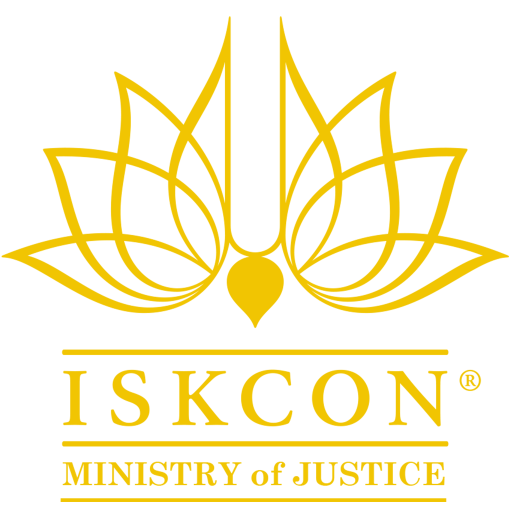International Society for Krishna Consciousness (ISKCON)
Srila Prabhupada founded ISKCON in July of 1966. The incorporation document states Seven Purposes of ISKCON:
- To systematically propagate spiritual knowledge to society at large and to educate all peoples in the techniques of spiritual life in order to check the imbalance of values in life and to achieve real unity and peace in the world.
- To propagate a consciousness of Krishna as it is revealed in the Bhagavad-gita and Srimad Bhagavatam.
- To bring the members of the Society together with each other and nearer to Krishna, the prime entity, and thus to develop the idea, within the members, and humanity at large, that each soul is part and parcel of the quality of Godhead (Krishna).
- To teach and encourage the Sankirtan movement of congregational chanting of the holy name of God as revealed in the teachings of Lord Sri Chaitanya Mahaprabhu.
- To erect for the members, and for society at large, a holy place of transcendental pastimes, dedicated to the personality of Krishna.
- To bring the members closer together for the purpose of teaching a simpler and more natural way of life.
- With a view towards achieving the aforementioned purposes, to publish and distribute periodicals, magazines, books and other writings.
Connected more than
Devotees globally
having over
Temples & Centers Globally
Distributed
Spiritual Books worldwide
Serving more than
of meals daily, in more than 60 countries
more than
Registered Educational Institutes
More than
Youth educated in personality & Character Development
Celebrating over
years of Success
More than
Patients treated
More than
Sustainable Farm Communities & Eco-Villages
What is ISKCON?
The International Society for Krishna Consciousness (ISKCON), otherwise known as the Hare Krishna movement, includes five hundred major centers, temples and rural communities, nearly one hundred affilated vegetarian restaurants, thousands of namahattas or local meeting groups, a wide variety of community projects, and millions of congregational members worldwide. Although less than fifty years on the global stage, ISKCON has expanded widely since its founding by His Divine Grace A. C. Bhaktivedanta Swami Prabhupāda in New York City in 1966. ISKCON belongs to the Gaudiya-Vaishnava sampradāya, a monotheistic tradition within the Vedic or Hindu culture. Philosophically it is based on the Sanskrit texts Bhagavad-gītā and the Bhagavat Purana, or Srimad Bhagavatam. These are the historic texts of the devotional bhakti yoga tradition, which teaches that the ultimate goal for all living beings is to reawaken their love for God, or Lord Krishna, the “all-attractive one”.
God is known across the world by many names including Allah, Jehovah, Yahweh, Rama, etc. ISKCON devotees chant God’s names in the form of the maha-mantra, or the great prayer for deliverance: Hare Krishna, Hare Krishna, Krishna Krishna, Hare Hare/Hare Rama Hare Rama, Rama Rama, Hare Hare. Many leading academics have highlighted ISKCON’s authenticity. Diana Eck, Professor of Comparative Religion and Indian Studies at Harvard University, describes the movement as “a tradition that commands a respected place in the religious life of humankind.” In the 1980s Dr. A. L. Basham, one of the world’s authorities on Indian history and culture, wrote of ISKCON that, “It arose out of next to nothing in less than twenty years and has become known all over the West. This, I feel, is a sign of the times and an important fact in the history of the Western world.”
ISKCON’s founder, Srila Prabhupada, has drawn appreciation from scholars and religious leaders alike for his remarkable achievement in presenting India’s Vaishnava spiritual culture in a relevant manner to contemporary Western and worldwide audiences. Members of ISKCON practice bhakti-yoga in their homes and also worship in temples. They also promote bhakti-yoga, or Krishna Consciousness, through festivals, the performing arts, yoga seminars, public chanting, and the distribution of the society’s literatures. ISKCON members have also opened hospitals, schools, colleges, eco-villages, free food distribution projects, and other institutions as a practical application of the path of devotional yoga.
Leadership
Before passing on in 1977, Srila Prabhupada established the Governing Body Commission (GBC) as ISKCON’s ultimate managing authority. Its primary responsibility is to preserve, disseminate, and carry out the instructions of Srila Prabhupada. The GBC convenes in Mayapur, West Bengal, for an Annual General Meeting and passes resolutions by a voting process. This ecclesiastic body consists of thirtysome members who individually oversee the management and spiritual standards of all ISKCON centers, affiliated projects, and devotees in assigned geographic regions. GBC members also supervise projects, initiatives, and ministries. An executive director, the heads of ISKCON ministries, and the GBC deputies support the GBC. Working under the GBC are Regional Governing Bodies (RGBs) and Temple Presidents. Each ISKCON temple is individually incorporated and manages its affairs through local leadership.
ABOUT US
The ISKCON Ministry of Justice promotes fairness, accountability, and harmony within the ISKCON community. It ensures ethical governance and supports conflict resolution in alignment with Vedic principles and ISKCON’s spiritual values.
SUBSCRIBE TO NEWSLETTER
Copyright © ISKCON Ministry of Justice 2025. All rights reserved.
